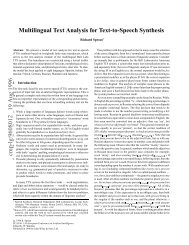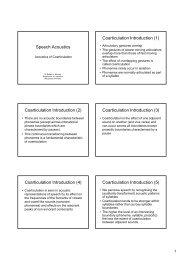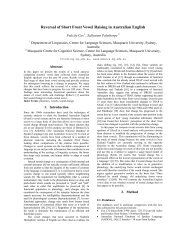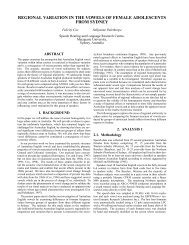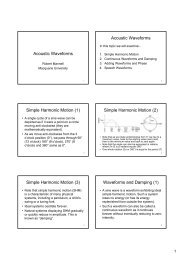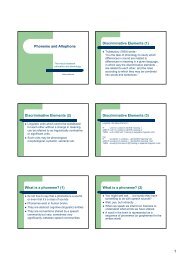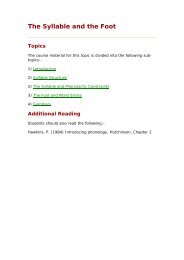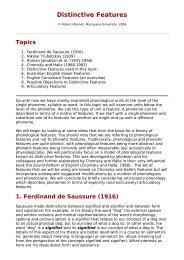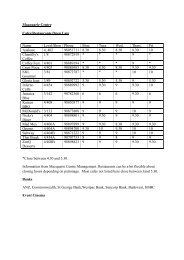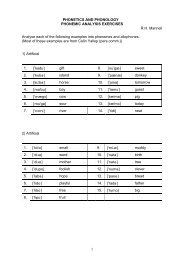Festival Speech Synthesis System: - Speech Resource Pages
Festival Speech Synthesis System: - Speech Resource Pages
Festival Speech Synthesis System: - Speech Resource Pages
You also want an ePaper? Increase the reach of your titles
YUMPU automatically turns print PDFs into web optimized ePapers that Google loves.
held), and voices_dir (pointing to voice directories) should be reset here if necessary.<br />
The default installation will try to find its lexicons and voices automatically based on the value of load-path (this<br />
is derived from FESTIVAL_HOME at compilation time or by using the --libdir at run-time). If the voices and<br />
lexicons have been unpacked into subdirectories of the library directory (the default) then no site specific<br />
initialization of the above pathnames will be necessary.<br />
The second site specific file is `siteinit.scm'. Typical examples of local initialization are as follows. The<br />
default audio output method is NCD's NAS system if that is supported as that's what we use normally in CSTR. If it<br />
is not supported, any hardware specific mode is the default (e.g. sun16audio, freebas16audio, linux16audio or<br />
mplayeraudio). But that default is just a setting in `init.scm'. If for example in your environment you may wish<br />
the default audio output method to be 8k mulaw through `/dev/audio' you should add the following line to your<br />
`siteinit.scm' file<br />
(Parameter.set 'Audio_Method 'sunaudio)<br />
Note the use of Parameter.set rather than Parameter.def the second function will not reset the value if it is<br />
already set. Remember that you may use the audio methods sun16audio. linux16audio or<br />
freebsd16audio only if NATIVE_AUDIO was selected in `speech_tools/config/config' and your<br />
are on such machines. The <strong>Festival</strong> variable *modules* contains a list of all supported functions/modules in a<br />
particular installation including audio support. Check the value of that variable if things aren't what you expect.<br />
If you are installing on a machine whose audio is not directly supported by the speech tools library, an external<br />
command may be executed to play a waveform. The following example is for an imaginary machine that can play<br />
audio files through a program called `adplay' with arguments for sample rate and file type. When playing<br />
waveforms, <strong>Festival</strong>, by default, outputs as unheadered waveform in native byte order. In this example you would set<br />
up the default audio playing mechanism in `siteinit.scm' as follows<br />
(Parameter.set 'Audio_Method 'Audio_Command)<br />
(Parameter.set 'Audio_Command "adplay -raw -r $SR $FILE")<br />
For Audio_Command method of playing waveforms <strong>Festival</strong> supports two additional audio parameters.<br />
Audio_Required_Rate allows you to use <strong>Festival</strong>s internal sample rate conversion function to any desired rate.<br />
Note this may not be as good as playing the waveform at the sample rate it is originally created in, but as some<br />
hardware devices are restrictive in what sample rates they support, or have naive resample functions this could be<br />
optimal. The second addition audio parameter is Audio_Required_Format which can be used to specify the<br />
desired output forms of the file. The default is unheadered raw, but this may be any of the values supported by the<br />
speech tools (including nist, esps, snd, riff, aiff, audlab, raw and, if you really want it, ascii).<br />
For example suppose you run <strong>Festival</strong> on a remote machine and are not running any network audio system and want<br />
<strong>Festival</strong> to copy files back to your local machine and simply cat them to `/dev/audio'. The following would do<br />
that (assuming permissions for rsh are allowed).<br />
(Parameter.set 'Audio_Method 'Audio_Command)<br />
;; Make output file ulaw 8k (format ulaw implies 8k)<br />
(Parameter.set 'Audio_Required_Format 'ulaw)<br />
(Parameter.set 'Audio_Command<br />
"userhost=`echo $DISPLAY | sed 's/:.*$//'`; rcp $FILE $userhost:$FILE; \<br />
rsh $userhost \"cat $FILE >/dev/audio\" ; rsh $userhost \"rm $FILE\"")<br />
Note there are limits on how complex a command you want to put in the Audio_Command string directly. It can get<br />
very confusing with respect to quoting. It is therefore recommended that once you get past a certain complexity<br />
consider writing a simple shell script and calling it from the Audio_Command string.<br />
A second typical customization is setting the default speaker. Speakers depend on many things but due to various<br />
licence (and resource) restrictions you may only have some diphone/nphone databases available in your installation.<br />
The function name that is the value of voice_default is called immediately after `siteinit.scm' is loaded<br />
offering the opportunity for you to change it. In the standard distribution no change should be required. If you<br />
download all the distributed voices voice_rab_diphone is the default voice. You may change this for a site by



